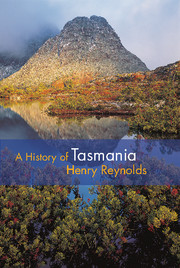Book contents
- Frontmatter
- Contents
- Illustrations
- Acknowledgements
- Introduction
- 1 First Meetings, Extraordinary Encounters
- 2 Van Diemen's Land: Settling in the enviable island
- 3 The Black War: The tragic fate of the Tasmanian Aborigines
- 4 An Indelible Stain?
- 5 The Triumph of Colonisation
- 6 The Politics of Van Diemen's Land
- 7 The Convict System
- 8 Post-penal Depression, 1856–70
- 9 Reform and Recovery
- 10 Federation and War
- 11 Between the Wars
- 12 Postwar Tasmania
- 13 Towards the Bicentenary
- Notes
- Sources
- Index
5 - The Triumph of Colonisation
Published online by Cambridge University Press: 05 April 2012
- Frontmatter
- Contents
- Illustrations
- Acknowledgements
- Introduction
- 1 First Meetings, Extraordinary Encounters
- 2 Van Diemen's Land: Settling in the enviable island
- 3 The Black War: The tragic fate of the Tasmanian Aborigines
- 4 An Indelible Stain?
- 5 The Triumph of Colonisation
- 6 The Politics of Van Diemen's Land
- 7 The Convict System
- 8 Post-penal Depression, 1856–70
- 9 Reform and Recovery
- 10 Federation and War
- 11 Between the Wars
- 12 Postwar Tasmania
- 13 Towards the Bicentenary
- Notes
- Sources
- Index
Summary
The opening of the Ross Bridge, which spanned the Macquarie River, in October 1836 was one of Governor George Arthur's last official appearances prior to his departure from the colony a week later. It was a notable occasion. In a procession following the vice-regal party 37 carriages of different descriptions crossed the new carriageway to gather for a celebratory picnic. The reporter from the Hobart Town Courier observed that the ‘wines from Champagne to humble port were excellent’ and that ample justice was done to them. Local Police Magistrate Benjamin Horne told his festive audience that he had arrived in the district 13 years before when the only structure apparent was one mud hut, but now:
A trackless inhospitable wilderness that had but a few years ago acknowledged no other Lord but the wily savage, has been made to yield to the industry of civilized man. Its plains reduced to a state of high fertility, amply supply the wants of a numerous and rapidly increasing population. The forests and mountains, formerly the haunt of the wild native and the lawless, are now the peaceful abode of the shepherd, and his flocks secure from every danger, whilst the unsightly sod hut, the emblem of our infancy, has everywhere vanished, to make room for substantial, comfortable dwellings.
It was a speech that would have pleased the governor. As he reflected on his 12 years in the colony he was able to put aside his remorse about the fate of the Aborigines and to celebrate what historian John West was later to term ‘the triumph of colonisation’.
- Type
- Chapter
- Information
- A History of Tasmania , pp. 88 - 111Publisher: Cambridge University PressPrint publication year: 2011



